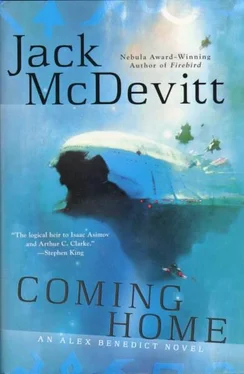“Of course they do, Charles.” Kolchevsky’s smile revealed that he was tolerant of his host’s lack of insight. “Some of us, most of us, I guess, feel a need to establish that we matter. That we leave a mark. But putting a babbling version of yourself out there for every idiot to talk to doesn’t get the job done. In fact, all it does accomplish is to waste time.” Koeffler looked about to jump in, but Kolchevsky waved him off. “I’m not saying everyone who puts a version of himself online is an idiot, Charles. What I am saying is that our time is limited. If we really want to accomplish something, then by God we should do it. And stop the posturing.”
“Are you saying you’ve never had an avatar?”
He snorted. “When I was sixteen, I had one. The girls all laughed at it.” He sat back, amused at the recollection as the mood lightened. “There was one girl in particular whom I just loved. In the way that only a sixteen-year-old can. She told me that she could go for the avatar and wished I were more like him.”
“So you took it down?”
“Charles, do you have one of those things?”
Koeffler turned it into a joke without answering, and they went to another subject.
Alex shook his head. “If you’re in business,” he said, “you have to have one of those things.”
I couldn’t resist laughing. Alex was also amused. “I wonder,” he said, “what happened to him? To Kolchevsky.”
“You don’t sound very sympathetic.”
“Well, I suspect he’s made a few enemies.”
“You don’t think somebody actually took him down, do you?”
“No, not really. The people he usually went after weren’t the type to resort to violence.”
“So what do you think?”
“I’ve no idea. For all we know, he might have fallen into the Melony. But that probably didn’t happen or we’d have gotten a pollution problem.”
“Alex—”
“Okay, I’ll stop. Let me know if you hear anything. If anybody calls, tell them to check with our clients. He might be out berating one of them.” He checked the time. “Have to go,” he said. “Got an auction.”
He rarely brought anything of value back from the auctions, but it happened occasionally. And business was slow. He’d been gone about an hour when we got a call from Fenn Redfield, the police inspector. “Hi, Chase,” he said. “Is Alex there?”
“He’s downtown on business, Fenn. Can I help you?”
“You know that Kolchevsky’s gone missing?”
“Yes. Is Alex a suspect?” I couldn’t resist myself.
“Not yet,” he said. “Kolchevsky seems to have just walked off the planet. We’re talking to everybody we know who had any kind of connection with him. I’m hoping Alex might have an idea where he could have gone.”
“If he did, Fenn, he wasn’t telling me about it. But I’ll put you through to him. Hold on a second.”
* * *
That evening, I closed the office and headed for dinner with friends. Afterward, we went to a concert, drank a little too much, and enjoyed ourselves thoroughly. Later, when I got home, I felt moderately guilty for having a good time while Kolchevsky was maybe dying somewhere. I don’t know why that was. I had no more affection for the guy than Alex did. Still, I guess, when people get in trouble, you forget about the kind of treatment you’ve received from them.
He’d lectured me a couple of times, and hadn’t been the only one to warn me that one day I’d regret helping Alex loot the past. That was actually the way he’d phrased it.
I don’t know. Sometimes I’m not sure how I feel about the operation we run. I understand that it would be nice if all these artifacts were placed where anyone could see them. But I’ve also seen the pure joy that accompanies ownership. I’ve watched older people, who’ve achieved pretty much everything you could ask from life, just light up when Alex delivered an artifact they’d been pursuing. Especially one touched, or used, by an historical figure. It’s not the same as being able to stand in a museum and admire something in a glass case. It has to do with owning the thing. With being able to take Byrum Corble’s link—the little silver one shaped like a dragon—being able to take it home and put it on display over the mantel.
There are a lot of artifacts. It seems to me there are plenty for public display, and more than enough left over for private collectors. So why not? Why do museums have to control them all?
Why do I feel I have to justify what we do?
When I went to bed, nothing had changed regarding Kolchevsky. He was by then missing almost three days.
In the morning, though, there was news: His skimmer had been found. On the parking lot at a restaurant at the foot of Mt. Barrow. Barrow was about fifteen miles northwest of Andiquar. The police were concentrating their search in that area.
“Why are you so caught up in this thing?” I asked Alex. “That guy never had a kind word for either of us.”
“Just curiosity, Chase. I’ll admit I didn’t care much for him.”
“I think he was jealous of you. Take it as a compliment.”
His face took on a tolerant expression. “I’d have a hard time believing that.”
“Were you able to give Fenn any information?”
“Not really. A couple of names of people Kolchevsky was associated with. He probably already had them. But otherwise I had nothing. I didn’t know anything about his personal life.”
We sat down in the kitchen at the country house, and he poured coffee for us. “Did you get anything at the auction yesterday?”
“There were a couple of minor items I thought about picking up. A dress that belonged to Sonia Calleda. She wore it in”—he checked his notes—“ Virgin Spring . It was in good shape, and I thought they were underestimating the value.”
“But you didn’t opt for it?”
“It’s not exactly our style.” He tried the coffee. “There was also a locket that Pyra Cacienda wore on her Victory tour back at the turn of the century. Again, probably seriously undervalued.”
“But—?”
“I don’t know. I backed off. Pure instinct, I guess.”
He left to go confer with one of our clients. It had something to do with artifacts from the Mute War. Rainbow didn’t actually own any, of course, but we specialized in putting clients together. And, on occasion, when we’d gotten some information, we’d converted ourselves into archeologists and gone out to see what we could find. We were actually pretty good at that. Gabe, of course, had been a dedicated archeologist, and Alex had learned from him. We both had.
* * *
Larry Earl called. “I don’t really have anything more on my father-in-law, Chase,” he said, “except that I remember his telling me that he’d gone to the site of the Florida Space Museum.”
“Okay, Larry, thanks.”
“He also mentioned that it’s underwater. He had to use diving gear.”
“I’ll tell Alex.”
His face creased. “Chase, I wish it hadn’t taken all these years to find that thing.”
“You mean the transmitter?”
“Yes. We were wondering if we shouldn’t just sell it? Take what we can get and forget the whole thing?”
“I’d recommend you give it some time.”
* * *
“I’m not surprised,” said Alex. “He was the kind of guy who couldn’t have resisted going down to the museum. I don’t think he could have found much, though. People have been looking through it for thousands of years.”
“Does he mention it anywhere?”
“Not that I’ve come across. I’ve watched a good many of his addresses and gone through most of his papers.”
Читать дальше












